What side was Spain on during World War 2? Positioned under the leadership of Francisco Franco, Spain maintained a delicate neutrality, teetering on the edge of sympathy for the Axis powers.
Spain was a country exhausted by the Spanish Civil War (1936-1939). General Franco ascended to power and had steered Spain towards a path heavily influenced by the ideologies of Germany and Italy. But Franco declared a policy of strict neutrality to protect Spain from further conflict.
This article explores the complexities of Spain’s stance during the War, examining the diplomatic intricacies, internal dynamics, and the lasting impact on the nation’s post-Civil War recovery.
- 1. Spanish Civil War
- 2. Spain's Initial Stance in World War 2
- 3. Spanish Negotiations with Hitler
- 4. Spain's Economic Dealings with Germany
- 5. Controversial Decision on German Submarines
- 6. Covert Operations in Spain
- 7. Operation Mincemeat: A Masterstroke in WW2 Deception
- 8. Formation of the Blue Division (División Azul)
- 9. Spain and the Post-War Fallout
- Further Reading
1. Spanish Civil War
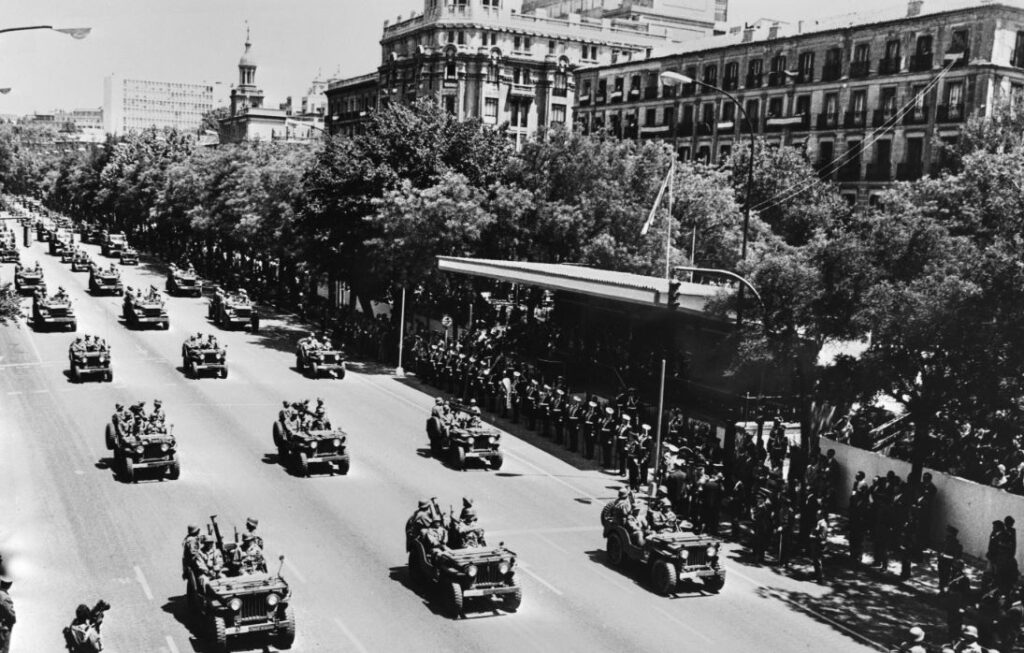
The Spanish Civil War was a brutal conflict that spanned from July 1936 to April 1939. This conflict tested the strength of ideologies and the endurance of a nation. At its heart, the war was a fierce struggle between Republicans and Nationalists for control of Spain, tearing apart the fabric of the nation.
Several foreign powers played a pivotal role in the Spanish Civil War.
The Republicans found support from the Soviet Union and France, aligning themselves with the liberal values.
On the other side of the divide, the Nationalists, led by General Francisco Franco, received backing from the authoritarian regimes of Germany and Italy.
This external support elevated the conflict from a domestic dispute to an international battleground, with Spain caught in the crossfire of broader geopolitical tensions.
As the dust settled on the Spanish Civil War, General Franco emerged victorious, solidifying his grip on power and establishing himself as the dictator of Francoist Spain on April 1, 1939.
The war laid the foundation for the ideological alignment that would shape Spain’s stance in the looming World War 2.
2. Spain’s Initial Stance in World War 2
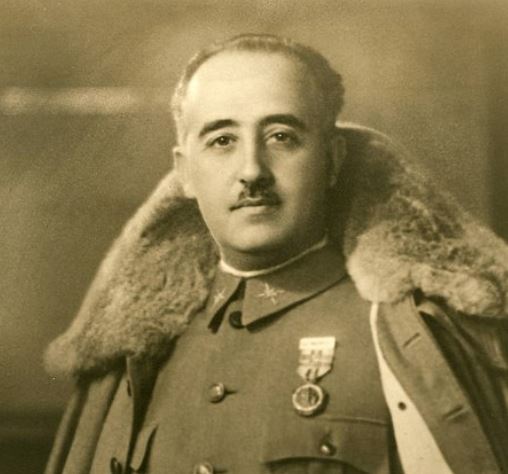
As World War 2 commenced, Spain, under the leadership of General Francisco Franco, declared a policy of strict neutrality.
This decision marked a deliberate effort to distance Spain from the escalating global conflict, a stark departure from its involvement in the Spanish Civil War.
Despite the ideological alignment with Axis powers, Franco, aware of Spain’s war-weary state, aimed to shield the nation from the ravages of another devastating conflict.
Franco was indebted to Adolf Hitler and Germany for their crucial support during the Spanish Civil War loomed large. The military aid and assistance provided by Nazi Germany had played a pivotal role in Franco’s triumph over the Republicans.
This debt of gratitude forged a delicate balancing act for Franco, torn between acknowledging his indebtedness to Hitler and the imperative to keep Spain out of the unfolding global conflagration.
3. Spanish Negotiations with Hitler
Amid the escalating tensions of World War 2, General Franco of Spain found himself entangled in a web of negotiations with Adolf Hitler, attempting to chart a course that safeguarded Spain’s interests.
Spain’s Initial Offer of Alliance (June 1940): Franco’s Eagerness to Join the Axis
In the aftermath of the swift and decisive German victory over France in June 1940, Spanish dictator Francisco Franco saw an opportunity to align his country with the Axis powers and potentially expand Spanish territory.
Franco had long harbored ambitions to restore Spain to its former imperial glory, and he believed that an alliance with Germany and Italy could help him achieve this goal.
On June 19, 1940, just days after the French surrender, Franco presented a memorandum to German Chancellor Adolf Hitler through the Spanish ambassador in Berlin. In this memorandum, Franco declared his readiness to enter the war on the side of the Axis powers under certain conditions.
Franco’s Alliance Conditions
Franco’s conditions included:
- The recognition of Spain’s territorial claims in North Africa, including French Morocco and Cameroon.
- The return of Gibraltar to Spanish control.
- Economic and military assistance from Germany and Italy.
Franco also expressed his desire to coordinate military operations with the Axis powers and to allow German troops to transit through Spain to attack British positions in North Africa.
Hitler was initially receptive to Franco’s offer, as he saw Spain as a potential ally that could help him secure his southern flank and put pressure on Britain.
However, Hitler was not prepared to meet all of Franco’s demands, particularly the cession of French Morocco and Cameroon, which he intended to take for Germany.
Despite this initial setback, Franco continued to pursue an alliance with the Axis powers. He believed that Spain could benefit from the German victories and that joining the war on the winning side would strengthen his own position at home and abroad.
Franco’s eagerness to join the Axis powers was motivated by a combination of factors, including:
- His desire to expand Spanish territory and restore Spain to its former imperial status.
- Franco’s belief that an alliance with Germany and Italy would help him achieve this goal.
- His admiration for Hitler and the Nazi regime.
- Franco’s antipathy towards Britain and France, which he saw as Spain’s traditional enemies.
Ultimately, Franco’s negotiations with Hitler would fail to produce an agreement, and Spain would remain neutral throughout World War 2.
Hitler’s Demands for Bases in Spain (August 1940)
Hitler’s initial response to Franco’s offer of alliance was positive. He saw Spain as a potential ally that could help him secure his southern flank and put pressure on Britain. However, Hitler was not prepared to meet all of Franco’s demands.
Hitler had insisted that Spain grant Germany air and naval bases in Spanish Morocco and the Canary Islands. These bases would have given Germany a strategic foothold in North Africa and the Atlantic Ocean, allowing it to threaten British shipping lanes and launch attacks on Allied positions in the Mediterranean Sea.
Franco’s refusal to grant Hitler’s demands for bases effectively ended the negotiations for an alliance between Spain and the Axis powers.
Hitler was unwilling to compromise on this issue, and Franco was unwilling to risk Spain’s neutrality and security by acceding to Hitler’s demands.
There were several reasons why Franco was so opposed to the idea of German bases in Spain:
- He feared that it would make Spain a target for Allied bombings and attacks.
- Franco believed that it would give Germany too much influence over Spanish affairs.
- He was concerned that it would violate Spain’s neutrality and drag the country into the war on the side of the Axis powers.
Franco was also aware that the Spanish people were generally opposed to the idea of an alliance with Germany. Many Spaniards had negative memories of the Spanish Civil War, which had been supported by both Germany and Italy. They did not want to see Spain become involved in another war, especially on the side of the Axis powers.
Ultimately, Franco’s decision to refuse Hitler’s demands for bases was a wise one. It kept Spain out of the war and prevented the country from becoming a battleground between the Axis and Allied powers.
Spain’s Continued Axis Negotiations (December 1940 – February 1941)
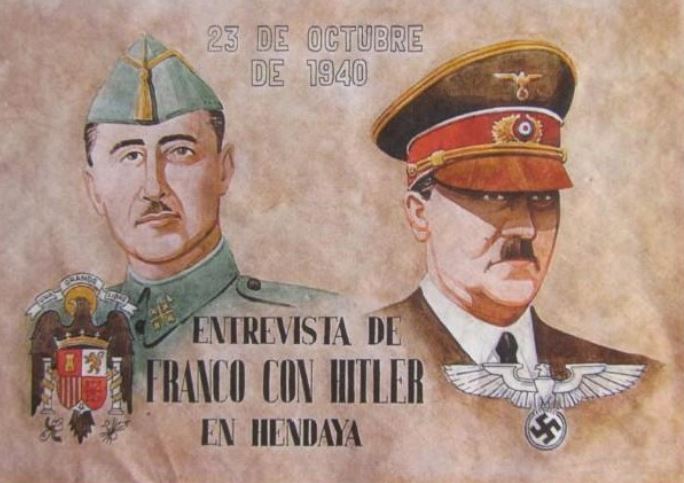
Despite the breakdown of negotiations in August 1940, Hitler continued to pressure Franco to join the Axis powers.
He offered grain and military supplies, hoping to entice Franco with the promise of economic and military assistance.
Franco, however, remained hesitant. He was still concerned about the ongoing threat from Britain, which still controlled Gibraltar and had a powerful navy.
He also feared that joining the war on the side of the Axis powers could lead to economic sanctions and diplomatic isolation from the Allied powers.
In December 1940, Hitler sent a letter to Franco in which he attempted to force Franco’s hand by demanding the passage of several divisions of German troops through Spain to attack Gibraltar. Franco refused, citing the danger that Britain still presented to Spain and its colonies.
In a second diplomatic letter, Hitler got tougher and offered grain and military supplies to Spain.
But by this time, however, Italian troops were being routed by the British in Italian East Africa, and the Royal Navy had displayed its freedom of action in Italian waters.
In February 1941, at Hitler’s request, Franco met privately with Italian leader Benito Mussolini in Bordighera, Italy. Hitler hoped that Mussolini could persuade Franco to enter the war. However, Mussolini was not interested in Franco’s help.
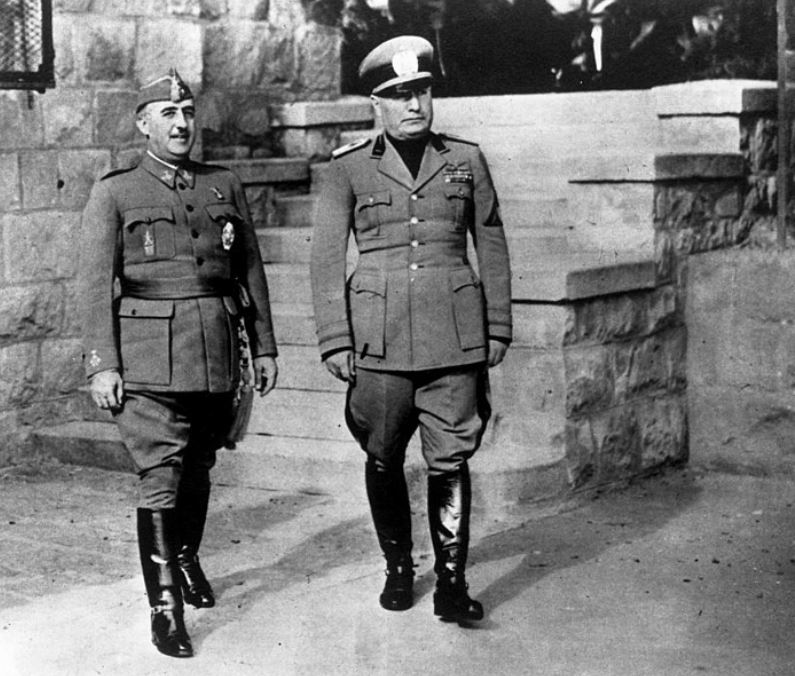
Franco’s continued refusal to join the Axis powers frustrated Hitler, who eventually gave up on trying to convince him.
Signing of the Anti-Comintern Pact (November 1941)
In November 1941, Franco took a step towards aligning Spain more closely with the Axis powers by signing the Anti-Comintern Pact with Germany and Italy. The pact was originally signed in 1936 as an agreement between Germany and Japan to combat the spread of communism. Italy joined the pact in 1937, and other countries, including Spain, would eventually sign on as well.
Franco’s decision to sign the Anti-Comintern Pact was motivated by several factors:
- He was genuinely opposed to communism and saw the Soviet Union as a threat to Spain and to Europe as a whole.
- Franco believed that signing the pact would improve Spain’s relations with Germany and Italy and help to secure economic and military assistance from those countries.
- He hoped that signing the pact would help to deter the Allied powers from taking action against Spain.
However, Franco was careful not to commit Spain to military action against the Allies. The Anti-Comintern Pact did not require its signatories to come to each other’s aid in the event of war. Franco made it clear that Spain would remain neutral in the ongoing conflict between the Axis and Allied powers.
Many Spaniards opposed the pact, seeing it as a sign that Franco was moving Spain closer to the Axis powers and potentially into the war. The Allied powers also condemned the pact, viewing it as a hostile act.
4. Spain’s Economic Dealings with Germany

General Franco’s nuanced approach to Spain’s involvement in World War 2 extended beyond diplomatic maneuvering to economic dealings.
Tungsten Supply for Hitler’s War Machine
In a pivotal move, Franco threw the weight of Spain’s resources behind Hitler’s war machine by providing a critical mineral—tungsten.
This strategic resource was essential for the production of armaments, making Spain a valuable economic ally for Germany. Franco’s decision to support the Axis powers in this manner demonstrated a willingness to reciprocate for past assistance while navigating the thin line of economic collaboration.
Imposition of an Oil Embargo on Spain
The Allies responded to Spain’s economic collaboration with the Axis by imposing an oil embargo. This punitive measure aimed to curb Spain’s tungsten exports to Germany, recognizing the direct role this resource played in sustaining the German war effort.
The embargo was a manifestation of the broader Allied strategy to exert economic pressure on nations collaborating with the Axis powers.
5. Controversial Decision on German Submarines
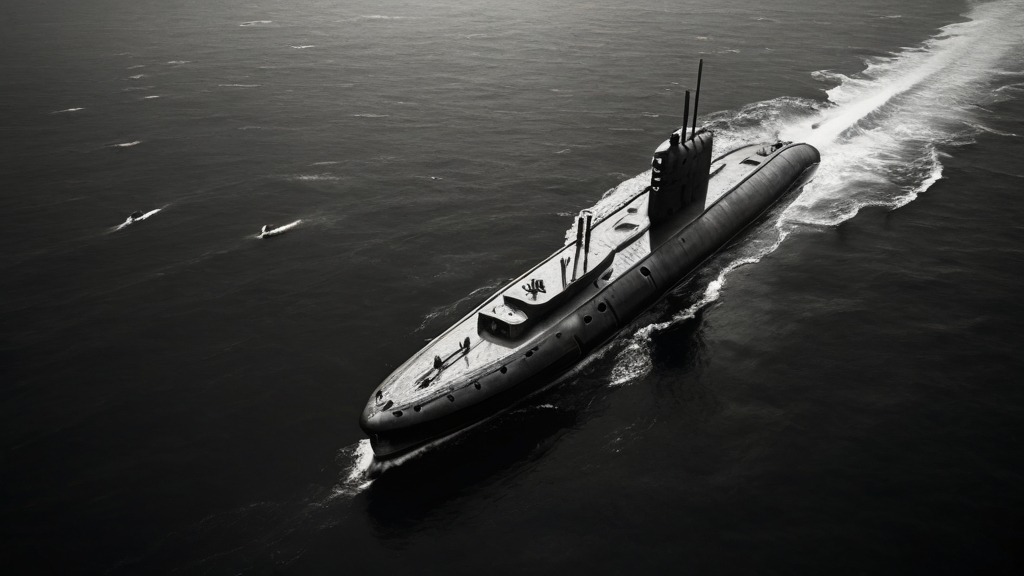
In 1941, Spain began to allow German U-boats to use its ports for refueling and repairs. This decision was controversial, as it was seen as a violation of Spain’s neutrality. The Allied powers protested, and they accused Spain of aiding the Axis war effort.
Franco’s government defended its decision, arguing that it was necessary to protect Spanish shipping from Allied attacks. However, many people believed that Franco was simply trying to curry favor with Hitler and the Axis powers.
Spain’s decision to allow German U-boats to use its ports had a significant impact on the war in the Atlantic. The U-boats were able to operate more effectively, and they sank a large number of Allied ships. This helped to delay the Allied victory in Europe.
6. Covert Operations in Spain
Covert operations played a crucial role in shaping Spain’s involvement.
Espionage: Both the Axis and Allied powers conducted espionage operations in Spain. German agents sought to gather intelligence on Allied activities in Spain and to recruit Spanish agents. Allied agents, on the other hand, sought to gather intelligence on German activities in Spain and to sabotage German operations.
Sabotage: Allied agents also carried out sabotage operations in Spain. For example, in 1942, British agents blew up a railway bridge in Spain that was being used to transport German supplies to North Africa. Spanish sabatours also blew up a ship in Gibraltar.
Resistance: There was also a small but active resistance movement in Spain. The resistance movement was made up of Spanish citizens who opposed Franco’s regime and who wanted to see Spain join the Allied powers. The resistance movement carried out a number of attacks on German and Italian targets in Spain.
Propaganda: Spain also engaged in propaganda operations abroad. For example, Spain broadcast pro-Axis propaganda on the radio and distributed pro-Axis leaflets.
Spain’s covert operations during World War 2 were significant, and they had a real impact on the course of the war. Spanish agents were able to gather valuable intelligence for both the Axis and Allied powers, and they also carried out sabotage operations that damaged the war effort of both sides.
7. Operation Mincemeat: A Masterstroke in WW2 Deception
In April 1942, an extraordinary plan that would unwittingly involved Spain, known as Operation Mincemeat, unfolded. This operation changed the course of the war.
Background:
In April 1942 a Spanish fisherman stumbled upon a dead man in a British uniform, connected to a briefcase. Little did he know that he had discovered the beginnings of Operation Mincemeat.
This chance discovery would play a pivotal role in deceiving the Germans and altering the course of the war in the Allies’ favor.
The Allied Deception Plan:
The masterminds behind Operation Mincemeat were none other than Ian Fleming, a young intelligence officer, and his team. Inspired by unconventional thinking, they aimed to outsmart Hitler’s expectations.
The primary goal was to convince the Germans of a fictitious invasion plan, steering their attention away from Sicily to Greece. This diversion was crucial for the success of Allied operations.
With the Allies planning to invade Sicily, a diversion was essential to mislead the Germans and keep their attention away from the actual target.
The chosen body needed to suggest a death related to a downed aircraft at sea, aligning with the fictional narrative.
Glyndwr Michael, a 34-year-old man who had probably committed suicide with phosphorus poisoning, became the central figure in the elaborate deception. He was given a new identity, Major William Martin.
The dead body was given a wallet containing an assortment of documents and personal items. This included receipts, letters, and a photograph of a fictional girlfriend named Pam.
The Plan’s Execution:
The body was taken from a Hackney mortuary to Spain.
Major William Martin, the fictional character created for Operation Mincemeat, was now ready to play his role in the grand deception for the Allied cause.
Key Events:
The plan involved delivering fake documents to Spain to mislead the Germans about the Allied invasion plans.
Upon finding the body, Spanish doctors conduct an autopsy. The British consul tried to intervene to prevent the revelation of the true nature of the operation.
The briefcase is then sent to Madrid, and Carl Aris Coolantiles, Hitler’s trusted operative in Spain, becomes involved in the process. Coolantiles believes in the authenticity of the documents and forwards them to German intelligence.
The Germans, including Hitler, believe the fake documents, leading to a diversion of their military resources.
The Allied invasion of Sicily (Operation Husky) becomes successful with significantly fewer casualties than expected.
8. Formation of the Blue Division (División Azul)
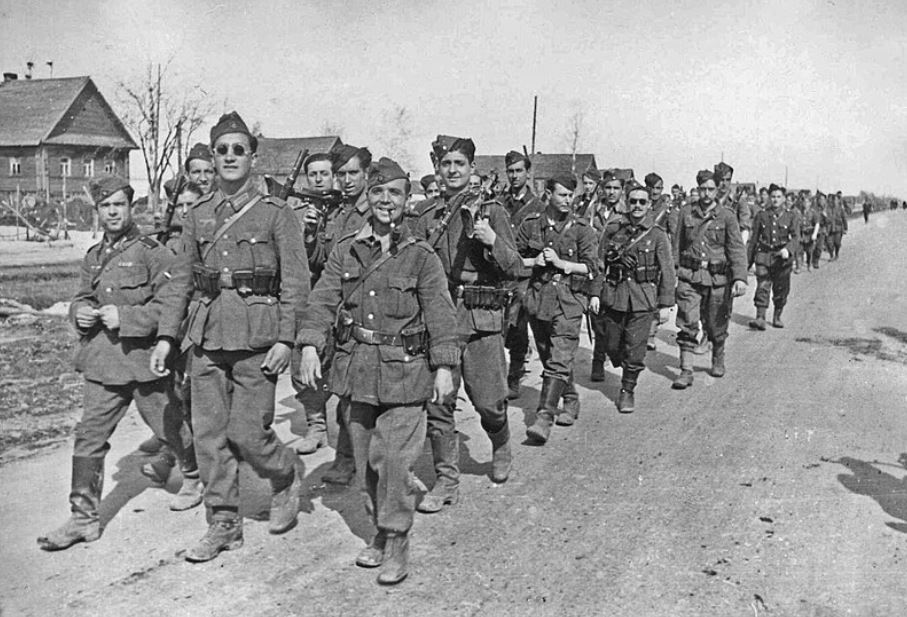
As an extension of Spain’s complex wartime strategy, the Blue Division, or División Azul, emerged as a distinctive military unit.
Comprising volunteers, primarily from nationalist ranks, the Blue Division was formed to support the Axis powers, notably engaging on the Eastern Front against the Soviet Union.
Blue Division’s Involvement on the Eastern Front
The Blue Division’s role on the Eastern Front proved significant, participating in several major battles and numerous smaller conflicts.
The Blue Division arrived on the Eastern Front in October 1941 and was assigned to Army Group North. The division saw its first combat action in the Battle of Leningrad, where it fought against the Soviet Red Army in some of the most brutal fighting of the war.
The Blue Division fought with distinction on the Eastern Front, and it quickly gained a reputation for its toughness and fighting ability. The division was involved in a number of major battles, including the Battle of Moscow, the Battle of Stalingrad, and the Battle of Kursk.
The Blue Division suffered heavy casualties during its time on the Eastern Front. By the end of the war, the division had lost over 40,000 men killed, wounded, or missing.
The Blue Division’s Withdrawal
The Blue Division was withdrawn from the Eastern Front in October 1943, after the Spanish government decided to end its participation in the war. The division returned to Spain, where it was disbanded.
The Blue Division remains a controversial topic in Spain. Some people view the division as a symbol of Spanish heroism and sacrifice, while others see it as a symbol of Spain’s collaboration with Nazi Germany.
9. Spain and the Post-War Fallout
The end of World War 2 left Spain in a difficult position on the international stage.
Despite having remained neutral under the dictatorship of Francisco Franco, Spain became isolated and was viewed with hostility by many other nations. Several factors contributed to this isolation.
Firstly, Spain’s neutrality was seen as tacit support for the Axis powers by the Allies. Though Spain did not directly assist Germany and Italy militarily, it did provide economic aid and allowed German intelligence operations. This led the United States and others to distrust Franco’s regime after the war.
Secondly, Spain’s fascist government alone made it a pariah to other liberal democracies.
Unlike the Axis nations, Spain underwent no rehabilitation or regime change after the war. The Western powers saw Franco’s Spain as politically unacceptable and a reminder of the fascism they had just defeated.
Finally, Spain’s declining economy and infrastructure from the civil war rendered it largely irrelevant in the post-war order. With no major role to play geopolitically or as a trading partner, most countries felt little need to interact with Spain.
This isolation meant Spain was excluded from the Marshall Plan, NATO, and the UN until the 1950s.
Slowly Spain began liberalizing its economy and stabilizing politically under international pressure.
By the 1970s, Spain had transitioned to become a modern democracy and NATO member under King Juan Carlos. Though marginalized after World War 2 due to its neutrality, fascism, and weakness, Spain ultimately aligned with the West and overcame its post-war isolation.
Further Reading
If you enjoyed this article, you may be interested to read about other countries who were neutral during World War 2, or the WW2 roles of countries such as Brazil, Iceland or Portugal.







